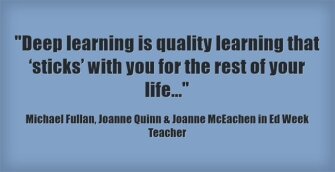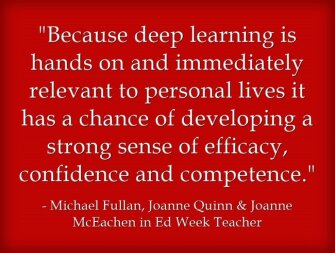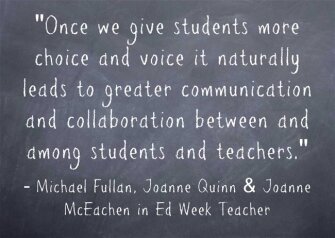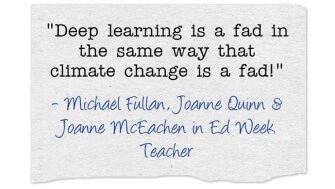
Michael Fullan, Joanne Quinn, and Joanne McEachen agreed to answer a few questions about their new book, Deep Learning: Engage The World, Change The World.
Michael Fullan is Professor Emeritus at OISE/UT, and Policy Adviser to the Premier, and to the Minister of Education of Ontario.
Joanne Quinn is Global Director of New Pedagogies for Deep Learning (NPDL) and leads an international consultancy focused on whole system change.
Joanne McEachen is CEO of The Learner First and serves as Global New Measures Director for New Pedagogies for Deep Learning (NPDL).
LF: This is probably not a fair question, but can you summarize what “deep learning” is and why you think it’s important?
Michael Fullan, Joanne Quinn & Joanne McEachen:
Deep learning is quality learning that ‘sticks’ with you for the rest of your life; it increases student engagement through personalization and ownership; it connects students to the ‘real world'; it resonates with spiritual values; it builds skills, knowledge, self-confidence, and self-efficacy; it builds new relationships with and between the learner, their teachers, families and communities; and it deepens the human desire to connect with others to do good. In terms of outcomes deep learning focuses on specific global competencies that we call the 6Cs: character, citizenship, collaboration, communication, creativity, and critical thinking.
In terms of pedagogy we have built learning around four elements: learning partnerships, pedagogical practices, learning environments, and leveraging digital. The whole set is fueled by collaborative inquiry. We have tools—ideas, rubrics, and progressions—to support development and implementation.
The other key factor for us is that we go from practice to theory. Over the past three years - with over 1000 schools in clusters in seven countries - we have established a ‘living laboratory’ of plan, do, reflect, extract key examples and learn; then do some more as we learn from each other and share with the world.

LF: Your books shared a number of specific examples of “deep learning,” but very few were from schools in the United States. Is that because you feel that most U.S. schools are not implementing that kind of instruction and that other countries are “ahead” of us, or because you wanted to be intentional about sharing a global focus? If it’s the former, why do you think that’s the case? If it’s the latter, what are some examples you can talk about in this country?
Michael Fullan, Joanne Quinn & Joanne McEachen:
You are correct that we wanted to be intentional about our global focus in the book and thus used examples from each of the seven countries. The majority of examples we used in the book were drawn from schools that had joined in 2014 and were in their second or third year of engagement. The U.S. clusters from Washington state, California, Michigan and Connecticut began their work with us in August of 2016 and had only been engaged a few months when the book was written. We are now able to highlight strong progress emerging in Birmingham District as part of Oakland Schools in Michigan, NWESD189 and Puget Sound ESD from Washington state. That said it is the case that the uptake for deep learning in other countries like Canada, Australia, Finland, and the like is greater than in the U.S.. which is hung up on the basics in literacy, numeracy, and high school graduation. We agree that the latter are essential but think that they are best pursued through deep learning. Maybe it is just a lag, and that once it gets started that it will take off - what we call ‘go slow to go fast.’
LF: You talk about how deep learning could “engage the disconnected” and “be a force for reversing the damaging effects of concentrated, intergenerational poverty and racism.” Can you elaborate on how that would work?
Michael Fullan, Joanne Quinn & Joanne McEachen:
We are blunt in the book: “There is no reason for the majority of students to take conventional schooling seriously.” This also applies to students who are doing okay on tests. To put it rhetorically, ‘Is it possible for a student to do well on tests all the way through school including graduation and still not be good at life?’ Deep learning with its focus on the 6Cs produces students who are ‘good at life.’ This applies to all students, but what we started to notice was that students who are most disconnected from regular schooling are the ones who respond best to the new way. They do this because deep learning is ‘hands on,’ applied to real life, inquiry based, relevant to practical immersion and so on. This development is especially noteworthy because we did not anticipate such dramatic impact—it emerged naturally from the work.
Disconnected students find schooling less relevant, but also they do not have a sense of ‘belonging’. Moreover their lives might be in disarray: safety, shelter, food, health may all be problematic. Deep learning cannot do everything, but it can encompass this wider array of issues in the context of learning and development. Because deep learning is hands on and immediately relevant to personal lives it has a chance of developing a strong sense of efficacy, confidence, and competence. If deep learning can help disconnected students come out of the rut they find themselves in they can actually ‘take off’ more than other students. Beyond their own situation such students come to see their own worth and their ability to contribute to the world. Peers and teachers notice that they contribute and find their place. We have many examples in the book of students who encountered such transformation. The bigger point is that all students gain. In a real sense we think that deep learning has a chance to help reduce inequity in education, which as we know is an ever-increasing trend with dangerous consequences for society as well as for individuals.
Finally, it is important to note that our work focused on the public education system. There are few things as crucial and as potentially uplifting as transforming the current system.

LF: If I wanted to begin to implement “deep learning” in my classroom tomorrow, what are some steps you would suggest I take?
Michael Fullan, Joanne Quinn & Joanne McEachen:
Every teacher finds their own entry point and that is the strength of this approach. Many teachers would begin by giving students greater voice and choice and ways in which you can increase student choice and voice. Once we give students more choice and voice it naturally leads to greater communication and collaboration between and among students and teachers. Next, teachers tend think about the learning environment and how to be more intentional in learning designs that foster deep learning (the development of the global competencies). The explicitness of the tools supports teacher in each step and builds clarity and precision.
From a change process perspective our biggest message is that our only chance is to pursue deep learning through collaborative networks that work together, learn from each other, consolidate what is being learned, spread the word and do more. We have seen that our deep learning has the characteristics of a social movement. It is built on positive contagion. Sorry for the slick language, but we are talking about system change that occurs through a dynamic process of ‘exploit upward, and liberate downward’. This means that the ‘system’ needs to frame the direction, and whatever they do, the other layers have to be proactive upward. The very good news is that teachers and students as individuals and groups become liberated around deep learning as forces for system change. This is potentially revolutionary because teachers and students en masse are powerful change agents. We have not yet found student who is too young to be a change agent.

LF: What would you say to educators who might hear about “deep learning” and, with a sigh, wonder if this is just another education fad that will fade away in time to be replaced by another one?
Michael Fullan, Joanne Quinn & Joanne McEachen:
Deep learning is a fad in the same way that climate change is a fad! Some people are slow to realize how essential it is, and how necessary it will be to engage in the phenomenon. We are hoping our book, and the action on the ground, will generate some irresistible shift. The 6C competencies have been around for many years and valued, but have never been actioned in a clear, consistent and accessible way. We are finding that character, citizenship, and creativity are catalytic Cs in that they cause all 6 to flourish. In any case we are finding that these competencies are hidden in curricula across the world, and thus can be made explicit as a set. The early results show big shifts in student engagement and improved learning as students contribute to the local and global context to solve problems that are important to them and others. Furthermore we know that employers, parents and the broader community value these competencies. So these are lifelong skills and deep learning has put the spotlight on how to foster them. Under supportive conditions deep learning can take off rapidly and result in substantial uptake and learning.
Still, we are the first ones to say that the transformation we are engaged in is precarious. Many forces favor the status quo, not to mention inertia itself. We don’t think the current system can be maintained. It could implode in favor of individualistic, and random networked interaction. We are doing our part to foster innovation and focus in a way that will make public education and associated learning exciting and up to the massive challenge of functioning in a world more complex than we have ever experienced. The world will only grow in complexity, and as we say, we can only hope that deep learners will inherit the world.

LF: Is there anything I haven’t asked that you’d like to share?
Michael Fullan, Joanne Quinn & Joanne McEachen:
Perhaps one thing that we should make more explicit. Technology is wildly unpredictable. We cannot even speculate what might happen. Our own view is that built-in deep learning is the only way to cope and take advantage of the future unknown. Our well-being and humanity as a species is dynamically at stake. We still like Paulo Freire’s stance, which we quote and use in the book: “The role of education is to act upon and transform the world [in order to] move towards ever new possibilities of a fuller and richer life individually and collectively”. That to us is the promise of deep learning!
LF: Thanks!
